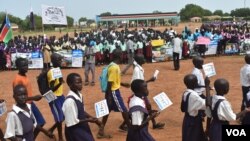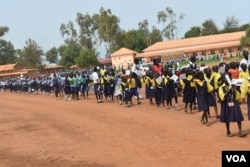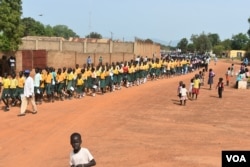Imatong state education officials launched a get-back-to-school campaign Wednesday to encourage thousands of school dropouts to return to class, despite the myriad challenges their families face. One of them is the fact that several schools are still being occupied by government and armed opposition forces.
Seventeen-year-old Agatha Idiongo, a pupil at Bright Christ Academy, was one of hundreds of young people who attended the launch. Agatha said financial troubles and the ongoing fighting have prevented her from achieving her dreams.
"I was dreaming in the future I want to become a pilot," she said. "The subject I like is social studies. Sometimes, if your parents do not provide you something, then you will say they do not want me to go to school. For instance, materials like books and pencils or what you do not have. [You lose] interest to go to school."
Education and UNICEF officials have emphasized the need to create a welcoming environment for students to remain at school.
Mikelele Ofuho, UNICEF program coordinator in Torit, said the children's agency is disappointed to see that many classrooms have either been destroyed or are frequently occupied by either government or armed opposition forces.
Ofuho also pointed out that competition for donors is high among aid agencies. He said infrastructure must be protected so that donors will be persuaded to continue funding education projects across South Sudan.
"There are a lot of crises all over the country and there is meager resources that we always get, and we want these resources to go to the intended beneficiary that can enhance education, though how little it is," Ofuho said.
Education officials in South Sudan estimate that more than 40,000 children have dropped out of school since fighting began more than three years ago.
Tuition fees
Adelio Ojina Quinto, director general of the Ministry of Education, said there are many reasons children drop out of school.
"With the crisis that has taken place, many people have run away. And compared to the first term we had a good number, but second term now I am afraid it is going to be much lower," Ojina said.
Ochara Moses, the head teacher of Christ Bright Academy Private School in Torit, said most children left his school because their parents were unable to pay tuition fees.
"We enrolled 1,500 primary and nursery pupils and it is really decreasing because last year we had like 1,800, but this year it has gone down because of this terrible crisis hitting the country," Moses said.
Eventually, Moses said, school administrators allowed children whose fees were unpaid to study, but some children continue to stay away from school for other reasons.
Torit parent Pious Lokoro called on government officials and nongovernmental organizations working in the education sector to establish feeding programs at schools to encourage children to remain enrolled.
Imatong State Education Minister Hassan Orbano said the government and NGOs must improve the education of South Sudanese children.
"We in the state Ministry of Education engage and support partners and parents to fulfill their mandates to send their children to school and professional institutions so that they can become good citizens of the state," Orbano said.
Orbano conceded that cultural practices such as early marriage is a big obstacle to enrolling girls in school.


